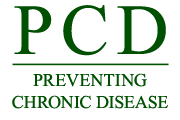PCD News Summary for August 31, 2017

Notice to News Media – PCD Release Time and Embargo Policy:
CDC’s News Media Branch releases to reporters the PCD media packet every Tuesday afternoon between 12 and 2 pm.
Embargoed until Thursday, August 31, at 12:00 PM ET
Improving Nutrition and Physical Activity Policies and Practices in Early Care and Education in Three States, 2014–2016
Integrating obesity prevention in early care and education programs may lead to improved and sustained healthy eating and physical activity policies and practices. The National Early Care and Education Learning Collaboratives (ECELC) project aims to facilitate best practices in nutrition, physical activity, screen time, and breastfeeding support and infant feeding among early care and education (ECE) programs across multiple states. The project uses a train-the-trainer approach with five in-person sessions, technical assistance, and action planning. In this special report, researchers describe the longitudinal practice-based evaluation of the project and assess whether ECE programs sustained changes in policies and practices one year after completing the project. They found that the number of best practices increased from pre-assessment to post-assessment but did not change significantly from post-assessment to follow-up assessment.
Melissa Newton
mnewton@cdc.gov
404-718-6281
A Community-Based Marketing Campaign at Farmers Markets to Encourage Fruit and Vegetable Purchases in Rural Counties With High Rates of Obesity, Kentucky, 2015–2016
Awareness of the Plate It Up Kentucky Proud (PIUKP) marketing campaign was significantly associated with a willingness to prepare fruits and vegetables at home, indicating that the use of marketing strategies at farmers markets may be an effective way to improve fruit and vegetable purchases in rural communities. Researchers conducted a community-based marketing campaign, PIUKP, in six rural communities over two years to determine the association between exposure to the campaign and fruit and vegetable purchases, adjusted for Supplemental Nutrition Assistance Program recipient status. This study highlights how a community-based marketing campaign may be effective at influencing shopping behaviors of rural residents, especially when implemented over an extended period of time.
Melissa Newton
mnewton@cdc.gov
404-718-6281
Using a Community Workshop Model to Initiate Policy, Systems, and Environmental Change That Support Active Living in Indiana, 2014–2015
Indiana communities that hosted active-living workshops created identifiable changes through policy adoption, the creation of new advisory committees, and new local funding allocations. Researchers conducted day-long active-living workshops in Indiana cities and towns to help organize and support public officials, community-based organizations, and advocates in their efforts to promote interventions that lead to more active communities. Following a consistent process of holding a community workshop and then conducting ongoing follow-up activities led to community changes within one year. This collaborative approach provides a successful model for communities to build capacity to implement strategies that support active living. It requires various community stakeholders to work closely together, using a shared approach to make changes that would be difficult to achieve if they were working independently.
Melissa Newton
mnewton@cdc.gov
404-718-6281
###
Note: Not all articles published in PCD represent work done at CDC. In your stories, please clarify whether a study was conducted by CDC (“a CDC study”) or by another institution (“a study published by CDC”). The opinions expressed by authors contributing to PCD do not necessarily reflect the opinions of CDC or the institutions with which the authors are affiliated. PCD requests that, when possible, you include a live link to the article in your stories.
###
U.S. DEPARTMENT OF HEALTH AND HUMAN SERVICES
CDC works 24/7 protecting America’s health, safety and security. Whether diseases start at home or abroad, are curable or preventable, chronic or acute, stem from human error or deliberate attack, CDC is committed to respond to America’s most pressing health challenges.
- Page last reviewed: August 31, 2017
- Page last updated: August 31, 2017
- Content source:



 ShareCompartir
ShareCompartir